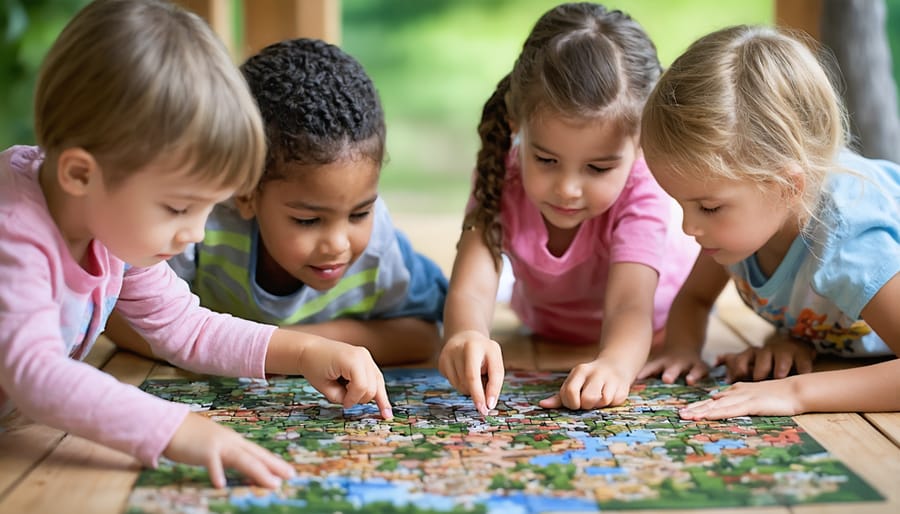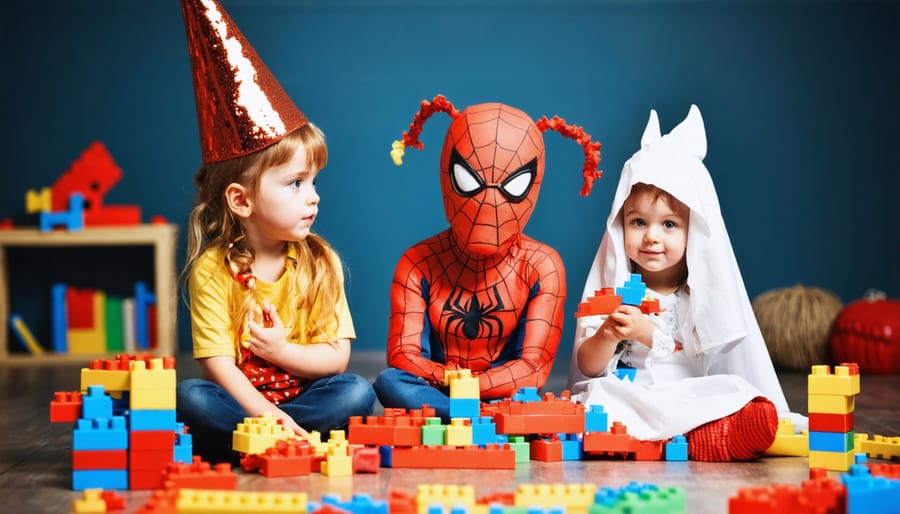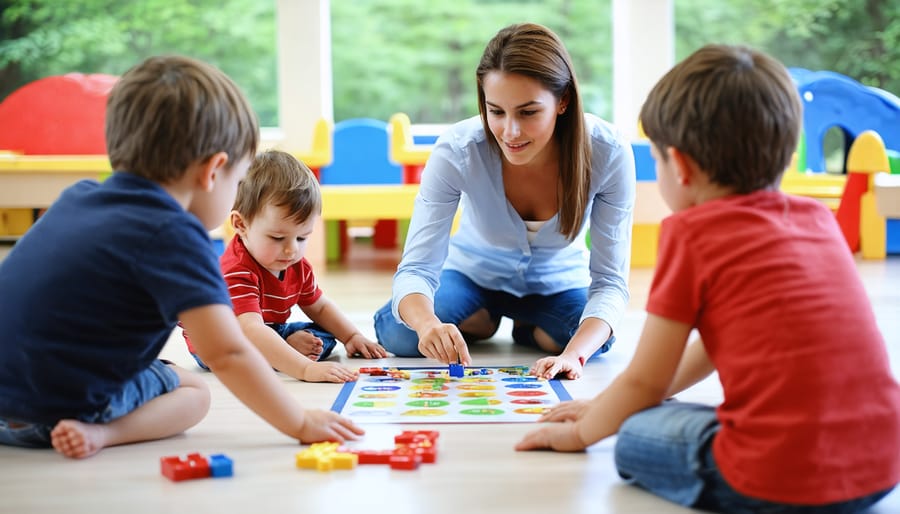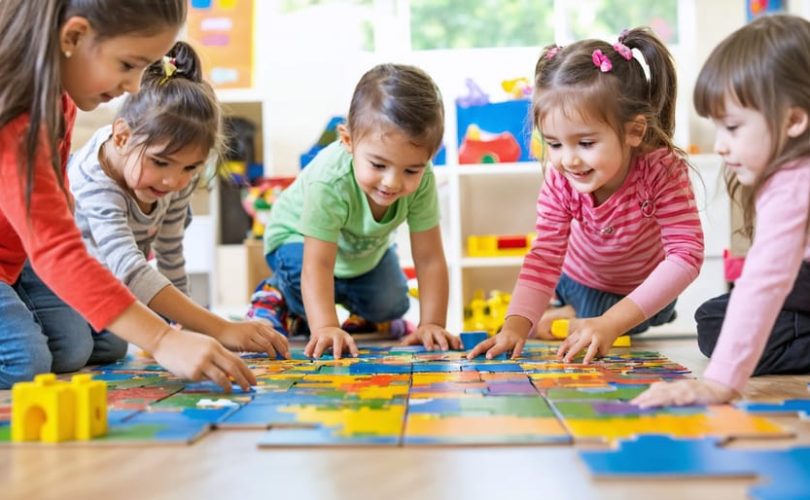Watch children navigate group settings to identify their natural social strengths and challenges during key child development stages. Create structured opportunities for small-group play that gradually increase in complexity, starting with pairs and expanding to larger groups as confidence grows. Guide children through conflict resolution by modeling respectful communication and teaching them to express feelings constructively.
Group social skills form the foundation of lifelong relationships, emotional intelligence, and success in school and work environments. When children learn to collaborate, share resources, and respect different perspectives in early group settings, they develop crucial abilities that shape their future interactions. These skills don’t just happen naturally – they require intentional practice, gentle guidance, and consistent reinforcement from caring adults.
Parents and educators play a vital role in this journey by creating safe spaces for social exploration, offering specific praise for positive interactions, and helping children process both successes and challenges. Through mindful observation and supportive intervention, we can help young people build the social competence they need to thrive in an increasingly interconnected world.
Why Group Play Matters for Social Development

The Social Brain and Play
When children engage in group play, their brains light up with activity in ways that individual play simply can’t match. The social centers of the brain, particularly the prefrontal cortex and temporal lobes, become highly engaged during interactive play experiences. Think of it as a mental workout that strengthens social muscles.
During group play, children’s brains release important chemicals like oxytocin, often called the “bonding hormone,” which helps them feel connected to their playmates. At the same time, their mirror neuron systems are hard at work, helping them understand and respond to others’ emotions and actions.
Dr. Sarah Chen, a child neuropsychologist, explains, “Group play creates rich neural pathways that support empathy, communication, and social problem-solving. When children play together, they’re not just having fun – they’re building the foundation for lifelong social skills.”
Research shows that regular group play experiences in early childhood lead to stronger social connections and better emotional regulation later in life. This is because play provides a safe space for children to practice reading social cues, taking turns, and managing conflicts – all while their brains are most receptive to learning these crucial skills.
Key Social Skills Developed Through Group Play
Through group play, children develop crucial social skills that form the foundation of their emotional intelligence in children and future relationships. When children engage in collaborative activities, they naturally learn to share resources, take turns, and respect others’ boundaries. This essential practice helps them understand fairness and cooperation.
Communication skills flourish as children express their ideas, negotiate roles, and work through conflicts with peers. Whether they’re building a block tower together or playing make-believe, they learn to listen actively and articulate their thoughts clearly.
Children also develop empathy by recognizing and responding to others’ emotions during play. When a playmate feels sad about losing a game or excited about a successful collaboration, children learn to read social cues and offer appropriate emotional support.
Leadership and followership skills emerge naturally as children alternate between different roles in group activities. They learn when to take charge and when to support others’ ideas, developing flexibility in social situations and understanding the importance of compromise.
These interactions create a safe space for children to practice problem-solving and conflict resolution, essential skills they’ll carry into adulthood.
Effective Group Play Activities That Build Social Skills
Cooperative Games and Team Challenges
Cooperative games and team challenges are powerful tools for developing social skills in group settings. Unlike competitive activities, these exercises focus on working together toward shared goals, fostering trust and mutual support among participants.
A favorite among educators is the “Human Knot,” where 6-10 children stand in a circle, join hands with different people across the circle, and work together to untangle themselves without letting go. This activity naturally encourages problem-solving, communication, and physical cooperation.
“Bridge Building” is another engaging challenge where small teams use limited materials (like newspaper and tape) to construct a bridge that can support a small weight. Children must share ideas, delegate tasks, and compromise to succeed, making it an excellent exercise in collaborative thinking.
For younger children, “Follow the Leader with a Twist” adds complexity to the classic game by having children mirror not just movements but emotions and expressions. This helps develop emotional awareness and non-verbal communication skills within the group.
“Silent Line-Up” challenges groups to arrange themselves in order (by height, age, or birthday) without speaking. This activity promotes non-verbal communication and creative problem-solving while building group awareness.
As Sarah Chen, a child development specialist, notes, “These activities create natural opportunities for children to practice crucial social skills like turn-taking, active listening, and compromise. The key is to choose age-appropriate challenges and provide gentle guidance when needed.”
Remember to debrief after each activity, asking children what worked well and what they learned about working together. This reflection helps reinforce the social skills being developed through play.
Role-Playing and Imaginative Play
Role-playing and imaginative play serve as powerful tools for developing essential social skills in group settings. When children engage in dramatic play scenarios, they naturally practice perspective-taking and emotional understanding, which are foundational elements of empathy development.
Consider a simple pretend restaurant scene: one child plays the server, another the chef, and others act as customers. In this scenario, children must coordinate their actions, communicate effectively, and understand different social roles. They learn to read social cues, respond appropriately, and adjust their behavior based on others’ reactions.
Dr. Sarah Thompson, a child development specialist, explains, “Through imaginative play, children create safe spaces to experiment with different social situations and emotional responses. They’re essentially rehearsing real-life interactions in a low-pressure environment.”
Here are some ways role-playing helps develop social understanding:
– Children learn to negotiate roles and take turns
– They practice using appropriate language and tone for different situations
– They develop conflict resolution skills through storyline challenges
– They experience emotions from multiple perspectives
– They learn to cooperate and work toward shared goals
Parents and educators can support this development by providing simple props, suggesting scenarios, and occasionally participating in the play. However, it’s important to let children lead these interactions and develop their own narratives.
Remember that some children may need gentle encouragement to join group play scenarios. Start with smaller groups and familiar situations to help build confidence. As children become more comfortable, they’ll naturally expand their dramatic play repertoire and social understanding.

Supporting Social Skill Development During Play
Adult Role in Guided Play
Adults play a crucial role in facilitating positive group interactions during play, acting as both supporters and gentle guides. Rather than directing the play, adults should position themselves as available resources who can help children navigate social situations when needed.
One effective approach is to observe closely and only intervene when necessary. For instance, if you notice children struggling to resolve a conflict, wait a moment to see if they can work it out themselves before stepping in with gentle suggestions. This builds their problem-solving skills while ensuring they feel supported.
When guidance is needed, use open-ended questions that encourage children to think critically about social situations. Instead of saying “Share the toys,” try asking “How can we make sure everyone gets a turn?” This empowers children to develop their own solutions while practicing empathy.
Adults can also model positive social behaviors during group play. Demonstrate active listening, use kind words, and show how to join games respectfully. Remember to praise specific positive interactions you observe, such as “I noticed how you helped Sarah when she was feeling left out.”
Creating an inclusive environment is essential. Help children recognize and celebrate their peers’ different abilities and interests. When you notice a child struggling to join in, subtly create opportunities for them to contribute meaningfully to the group activity.

Handling Social Challenges
Group play inevitably brings social challenges, but these moments offer valuable learning opportunities for children. When conflicts arise, it’s important to stay calm and view them as chances for growth rather than failures. As child psychologist Dr. Sarah Chen notes, “Every social challenge is a stepping stone toward better emotional intelligence.”
Common challenges include sharing resources, taking turns, and dealing with exclusion. To help children navigate these situations, adults can model positive problem-solving strategies and encourage open communication. When you notice tension building, guide children to express their feelings using “I” statements and practice active listening.
For instance, if two children want the same toy, teach them to negotiate by taking turns or finding alternative solutions. This approach to resolving childhood conflicts helps build crucial social skills that last a lifetime.
Create a supportive environment where children feel safe discussing their feelings. Sometimes, a child might need a brief break from group activities to regulate their emotions – this should be presented as a helpful tool rather than a punishment. Use positive reinforcement when you see children successfully working through challenges together.
Remember that every child develops social skills at their own pace. Some might need extra support or modified strategies to participate effectively in group activities. The key is maintaining a patient, understanding approach while consistently reinforcing positive social behaviors.
Measuring Progress and Celebrating Growth
Signs of Social Skill Development
Watching children develop social skills in group settings can be both exciting and reassuring for parents and educators. Several positive indicators show that a child is making progress in their social development. You might notice they’re beginning to share toys more willingly and take turns without constant prompting. They may also show increased empathy by offering comfort to peers who are upset or helping others without being asked.
Another encouraging sign is when children start engaging in cooperative play, moving beyond parallel play to actively working together on activities or games. You may observe them negotiating roles in pretend play, suggesting ideas to the group, and showing flexibility when plans change.
Improved communication is also key – watch for children using words to express their feelings instead of acting out physically, making appropriate eye contact, and responding when others speak to them. They might begin showing better listening skills and following group instructions more consistently.
Social confidence often develops gradually. You might notice children initiating conversations more frequently, joining group activities without hesitation, and showing pride in group accomplishments. They may also demonstrate better conflict resolution skills, attempting to solve problems with words before seeking adult help.
Remember that every child develops at their own pace, and these signs may appear at different times and in different orders. The important thing is to celebrate progress while continuing to provide opportunities for social growth through supportive group interactions.
Positive Reinforcement Strategies
Celebrating and acknowledging progress in social skills development can significantly boost children’s confidence and motivation to continue growing. Implementing effective positive reinforcement methods within group settings creates an encouraging environment where children feel safe to practice and improve their social interactions.
Consider creating a “kindness board” where children’s positive social behaviors are highlighted and celebrated. This could include simple acknowledgments like “Sarah helped Alex join the game” or “Miguel shared his art supplies with the group.” These public recognitions help children understand which behaviors are valued while inspiring others to follow suit.
Immediate verbal praise is another powerful tool. When you notice a child using appropriate social skills, offer specific feedback like “I noticed how carefully you listened to Jamie’s idea” rather than generic praise. This helps children connect their actions with positive outcomes.
Small rewards can also be effective when used thoughtfully. These might include earning special privileges or group celebration moments. However, focus on making the social interaction itself rewarding rather than relying too heavily on external rewards.
Remember to celebrate progress, not just perfection. Acknowledge when children make efforts to use new social skills, even if the execution isn’t flawless. This encourages persistence and helps build resilience in social situations.
Group social skills development through play is a journey that continues throughout childhood and beyond. As we’ve explored, collaborative play provides children with essential opportunities to learn negotiation, empathy, communication, and problem-solving skills in a natural, engaging way.
Remember that every child develops at their own pace, and what works for one may not work for another. The key is to create diverse opportunities for group interaction while maintaining a supportive, encouraging environment. Whether through structured activities like team sports and group projects, or free play scenarios like imaginative games and playground interactions, each experience contributes to your child’s social growth.
Parents and educators play a vital role in this development by modeling positive social behaviors, facilitating inclusive play environments, and providing gentle guidance when needed. Celebrate small victories, such as when a child successfully resolves a conflict or shows consideration for others’ feelings.
Continue to encourage participation in group activities that match your child’s interests and comfort level. As confidence grows, gradually introduce new social challenges and opportunities. Remember that setbacks are normal and can be valuable learning experiences when handled with patience and understanding.
By maintaining a consistent focus on fostering these essential social skills through play, you’re helping to build the foundation for lasting friendships, effective communication, and successful relationships throughout life.

